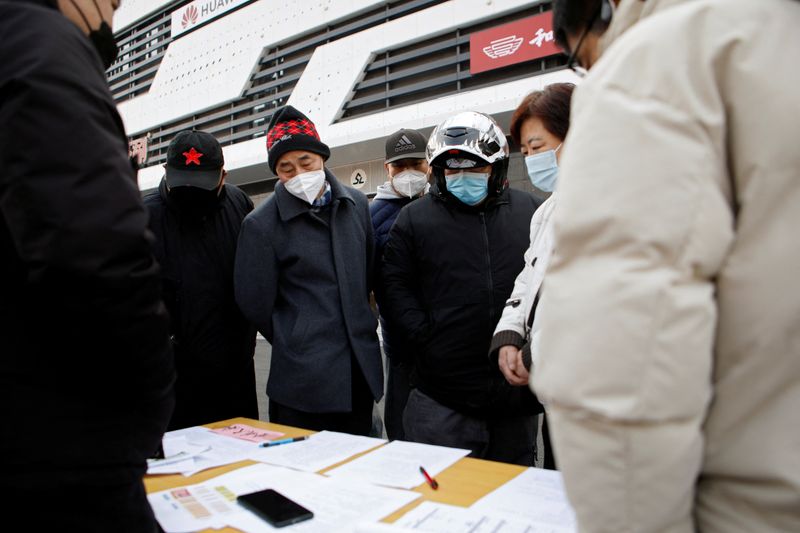By Ellen Zhang and Florence Lo
BEIJING (Reuters) - China's job fairs are making a comeback after being forced online by COVID-19 for three years, but subdued wages and less abundant offerings in sectors exposed to weakening external demand point to an uneven and guarded economic recovery.
Authorities announced hundreds of such events across the country this month, the latest sign that China is returning to its pre-COVID way of life and that youth unemployment, a major headache for Beijing, may ease from its near 20% peak.
In a country of 1.4 billion people, job fairs are one of the most efficient ways for employers and workers to connect. Although attendees said their long-awaited return is encouraging, some were not brimming with confidence.
"I only pray for a stable job, and do not have high salary expectations," said Liu Liangliang, 24, who was looking for a job in a hotel or property management company at a fair in Beijing on Thursday, one of more than 40 held in the capital in February. "The COVID outbreak has hurt many people. There will be more job seekers battling for offers this year."
Employment anxiety is widespread.
A survey of about 50,000 white-collar workers published on Thursday by Zhaopin, one of China's biggest recruiting firms, showed 47.3% of respondents were worried they may lose their jobs this year, up from 39.8% a year ago.
About 60% cited the "uncertain economic environment" as the main factor affecting their confidence, up from 48.4% in 2022.
Job confidence of those working in consumer-facing sectors, which are recovering faster from a low base, was higher than in sectors such as manufacturing, affected by weakening external demand, or property, which has only just started to show tentative signs of stabilising, the survey showed.
A human resources manager at Beijing Xiahang Jianianhua Hotel, who only gave his surname Zhang, said his company had three times more job openings compared with last year, as Chinese resumed travelling.
By contrast, Jin Chaofeng, whose company exports outdoor rattan furniture, said he has no plans to add to his payroll as orders from abroad are slowing.
"People in my industry are waiting and seeing, prudently," he said, adding that he plans to cut production by 20%-30% in March from a year earlier.
Frederic Neumann, chief Asia economist at HSBC, expects the service and manufacturing sectors to run at vastly different speeds this year, but said overall employment in China should grow.
"Restaurants, hotels, and entertainment venues are now scrambling to hire staff. This is especially helpful for younger workers," Neumann said. "The youth unemployment rate should start to fall in the coming months."
China's economy grew 3% last year, in one of its weakest performances in nearly half a century. Policymakers are expected to aim for growth of about 5%, which would still be below the blistering pre-pandemic pace.
That's partly because the pain caused by stringent COVID rules persists.
At another job fair in the capital, Wei, a former cleaner looking for similar work, said she and her unemployed husband are struggling with credit card debt.
Wei, who has a child in primary school and did not want to give her full name, citing personal privacy, quit her previous job last year after her employer wanted to cut her wages to 3,200 yuan ($465.34) per month from 3,500 yuan despite demanding she work late hours to conduct COVID-related disinfection.

"We owe the banks hundreds of thousands yuan," she said. "We are overwhelmingly anxious."
($1 = 6.8767 Chinese yuan renminbi)